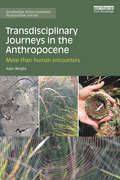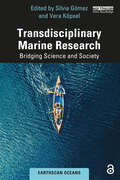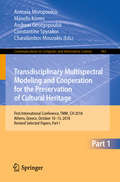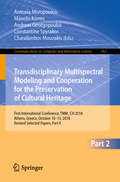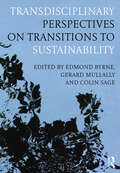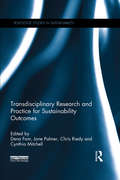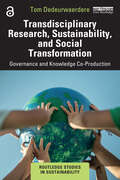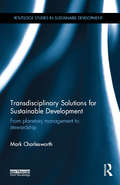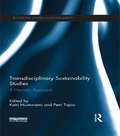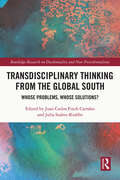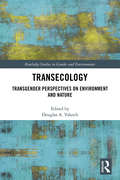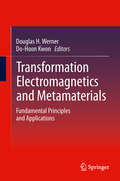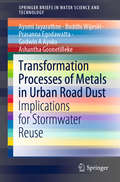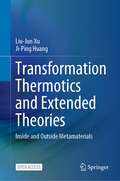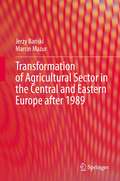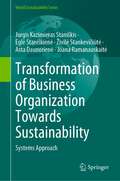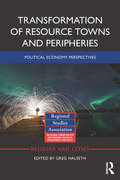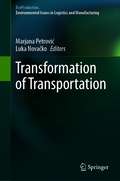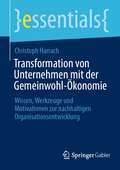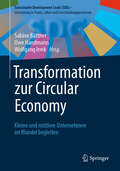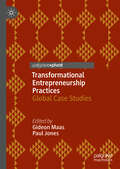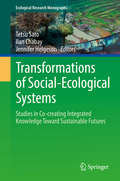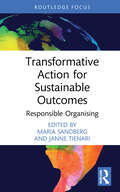- Table View
- List View
Transdisciplinary Journeys in the Anthropocene: More-than-human encounters (Routledge Environmental Humanities)
by Kate WrightTransdisciplinary Journeys in the Anthropocene offers a new perspective on international environmental scholarship, focusing on the emotional and affective connections between human and nonhuman lives to reveal fresh connections between global issues of climate change, species extinction and colonisation. Combining the rhythm of road travel, interviews with local Aboriginal Elders, and autobiographical storytelling, the book develops a new form of nature writing informed by concepts from posthumanism and the environmental humanities. It also highlights connections between the studied area and the global environment, drawing conceptual links between the auto-ethnographic accounts and international issues. This book will be of great interest to scholars and postgraduates in environmental philosophy, cultural studies, postcolonial theory, Australian studies, anthropology, literary and place studies, ecocriticism, history and animal studies. Transdisciplinary Journeys in the Anthropocene may also be beneficial to studies in nature writing, ecocriticism, environmental literature, postcolonial studies and Australian studies.
Transdisciplinary Marine Research: Bridging Science and Society (Earthscan Oceans)
by Vera Köpsel Sílvia GómezDrawing on the expertise of marine researchers from both the natural and social sciences, this book examines how we, as both scientists and societies, can return to a sustainable co-existence with the ocean and use the tools of transdisciplinarity to bring together the diverse forms of knowledge needed to achieve this important task. The marine sciences play a vital role in producing and providing the knowledge needed for a transition towards ocean sustainability. With a multitude of actors involved in using, exploiting, and safeguarding the seas, however, this task cannot be solved by science alone. Transdisciplinary research is needed, bringing together scientists and all other actors of society to jointly co-produce the knowledge and innovations that we so urgently need. In this context, this book examines and answers key questions at the forefront of transdisciplinary marine research: How can we provide approaches that integrate marine biodiversity and social systems in an appropriate relationship? What methodologies are most suitable to engage stakeholders in participatory processes providing new knowledge and tools for co-designing solutions with balanced socio-ecological embeddedness? How do we best integrate scientific with lay and local knowledge, and how are diverse knowledges valued in engagement activities? How can we reconcile socio-economic activities and the often divergent values attached to them to provide ethical principles for fair and equitable policy decisions? The book addresses these questions by combining an array of chapters about new theoretical approaches to transdisciplinary marine research, methodological considerations, as well as case studies from the nexus of the research and practices of engagement with a variety of stakeholder groups across the globe. This book will be of great interest to students and scholars studying marine science and ocean research across a wide range of disciplines, including marine biology, environmental governance and policy, ocean resource management, oceanography, environmental anthropology, human geography and sustainability. It will also be of interest to those looking to build a greater understanding of transdisciplinary research and knowledge co-production, and practitioners working alongside academics. ‘Chapter 1 and Chapter 8 of this book is available for free in PDF format as Open Access from the individual product page at www.routledge.com. It has been made available under a Creative Commons Attribution-Non Commercial-No Derivatives 4.0 license.’
Transdisciplinary Multispectral Modeling and Cooperation for the Preservation of Cultural Heritage: First International Conference, TMM_CH 2018, Athens, Greece, October 10–13, 2018, Revised Selected Papers, Part I (Communications in Computer and Information Science #961)
by Antonia Moropoulou Manolis Korres Andreas Georgopoulos Constantine Spyrakos Charalambos MouzakisThis two-volume set CCIS 961 and 962 constitutes the refereed post-conference proceedings of the First International Conference on Transdisciplinary Multispectral Modeling and Cooperation for the Preservation of Cultural Heritage, TMM_CH 2018, held in Athens, Greece, in October 2018.73 revised full papers of 237 submissions are included in these volumes. The papers of the first volume are organized in the following topical sections: the project of the rehabilitation of Holy Sepulchre’s Holy Aedicule as a pilot multispectral, multidimensional, novel approach through transdisciplinary and cooperation in the protection of monuments; digital heritage; novel educational approach for the preservation of monuments; resilience to climate change and natural hazards; conserving sustainably the materiality of structures and architectural authenticity; and interdisciplinary preservation and management of cultural heritage. And the papers of the second volume are organized in the following topical sections: sustainable preservation and management lessons learnt on emblematic monuments; cross-discipline earthquake protection and structural assessment of monuments; cultural heritage and pilgrimage tourism; reuse, circular economy and social participation as a leverage for the sustainable preservation and management of historic cities; inception – inclusive cultural heritage in Europe through 3D semantic modelling; heritage at risk; and advanced and non-destructive techniques for diagnosis, design and monitoring.
Transdisciplinary Multispectral Modeling and Cooperation for the Preservation of Cultural Heritage: First International Conference, TMM_CH 2018, Athens, Greece, October 10–13, 2018, Revised Selected Papers, Part II (Communications in Computer and Information Science #962)
by Antonia Moropoulou Manolis Korres Andreas Georgopoulos Constantine Spyrakos Charalambos MouzakisThis two-volume set CCIS 961 and 962 constitutes the refereed post-conference proceedings of the First International Conference on Transdisciplinary Multispectral Modeling and Cooperation for the Preservation of Cultural Heritage, TMM_CH 2018, held in Athens, Greece, in October 2018. 73 revised full papers of 237 submissions are included in these volumes. The papers of the first volume are organized in the following topical sections: the project of the rehabilitation of Holy Sepulchre’s Holy Aedicule as a pilot multispectral, multidimensional, novel approach through transdisciplinary and cooperation in the protection of monuments; digital heritage; novel educational approach for the preservation of monuments; resilience to climate change and natural hazards; conserving sustainably the materiality of structures and architectural authenticity; and interdisciplinary preservation and management of cultural heritage. And the papers of the second volume are organized in the following topical sections: sustainable preservation and management lessons learnt on emblematic monuments; cross-discipline earthquake protection and structural assessment of monuments; cultural heritage and pilgrimage tourism; reuse, circular economy and social participation as a leverage for the sustainable preservation and management of historic cities; inception – inclusive cultural heritage in Europe through 3D semantic modelling; heritage at risk; and advanced and non-destructive techniques for diagnosis, design and monitoring.
Transdisciplinary Perspectives on Transitions to Sustainability
by Colin Sage Edmond Byrne Gerard MullallyDemonstrating how a university can, in a very practical and pragmatic way, be re-envisioned through a transdisciplinary informed frame, this book shows how through an open and collegiate spirit of inquiry the most pressing and multifaceted issue of contemporary societal (un)sustainability can be addressed and understood in a way that transcends narrow disciplinary work. It also provides a practical exemplar of how far more meaningful deliberation, understandings and options for action in relation to contemporary sustainability-related crises can emerge than could otherwise be achieved. Indeed it helps demonstrate how only through a transdisciplinary ethos and approach can real progress be achieved. The fact that this can be done in parallel to (or perhaps underneath) the day-to-day business of the university serves to highlight how even micro seed initiatives can further the process of breaking down silos and reuniting C.P. Snow’s ‘two cultures’ after some four centuries of the relentless project of modernity. While much has been written and talked about with respect to both sustainability and transdisciplinarity, this book offers a pragmatic example which hopefully will signpost the ways others can, will and indeed must follow in our common quest for real progress.
Transdisciplinary Research and Practice for Sustainability Outcomes (Routledge Studies in Sustainability)
by Dena Fam, Jane Palmer, Chris Riedy and Cynthia Mitchell‘Transdisciplinarity’ is a form of research and practice that synthesises knowledge from a range of academic disciplines and from the community. There is now global interest and a significant body of work on transdisciplinarity and its potential to address the apparently intractable problems of society. This creates the opportunity for a specific focus on its practical application to sustainability issues. Transdisciplinary Research and Practice for Sustainability Outcomes examines the role of transdisciplinarity in the transformations needed for a sustainable world. After an historical overview of transdisciplinarity, Part I focuses on tools and frameworks to achieve sustainability outcomes in practice and Part II consolidates work by a number of scholars on supporting transdisciplinary researchers and practitioners. Part III is a series of case studies including several international examples that demonstrate the challenges and rewards of transdisciplinary work. The concluding chapter proposes a future research pathway for understanding the human factors that underpin successful transdisciplinary research. As Emeritus Professor Valerie Brown AO notes in her Preface, this book moves transdisciplinary inquiry into the academic and social mainstream. It will be of great interest to researchers and practitioners in the fields of sustainability, qualitative research methods, environmental impact assessment and development studies.
Transdisciplinary Research, Sustainability, and Social Transformation: Governance and Knowledge Co-Production (Routledge Studies in Sustainability)
by Tom DedeurwaerdereThis book addresses the gap in the existing literature on the governance of transdisciplinary research partnerships in transformational sustainability research by exploring the governance of knowledge co-production in coupled socio-ecological system dynamics. Multiple social and ecological crises raise new cross-sectoral research questions that call for an evolution in contemporary science in the direction of society-wide knowledge co-production on sustainability transformations of interdependent social and ecological systems. This book proposes a new approach to this based on enabling capacities for collaboration among scientific researchers and societal actors with diverse values, perspectives, and research interests. By drawing upon the thriving literature on the conditions for community and multistakeholder-driven collective action, the analysis sheds new light on the governance arrangements for organizing so-called transdisciplinary research partnerships for sustainability. This book identifies robust conditions that lead to effective collaborative research with societal actors and digs deeper into capacity building for partnership research through fostering social learning on sustainability values among research partners and organizing training and knowledge exchange at institutions of higher education. The book proposes solutions for addressing collective action challenges in transdisciplinary partnerships in an accessible and broadly interdisciplinary manner to a large audience of sustainability scholars and practitioners. It will be of interest to students and researchers in the fields of sustainable development, social ecological transitions, and science policy, while also being a useful resource for engineers, QSE managers, and policymakers.
Transdisciplinary Research, Sustainability, and Social Transformation: Governance and Knowledge Co-Production (Routledge Studies in Sustainability)
by Tom DedeurwaerdereThis book addresses the gap in the existing literature on the governance of transdisciplinary research partnerships in transformational sustainability research by exploring the governance of knowledge co-production in coupled socio-ecological system dynamics.Multiple social and ecological crises raise new cross-sectoral research questions that call for an evolution in contemporary science in the direction of society-wide knowledge co-production on sustainability transformations of interdependent social and ecological systems. This book proposes a new approach to this based on enabling capacities for collaboration among scientific researchers and societal actors with diverse values, perspectives, and research interests. By drawing upon the thriving literature on the conditions for community and multistakeholder-driven collective action, the analysis sheds new light on the governance arrangements for organizing so-called transdisciplinary research partnerships for sustainability. This book identifies robust conditions that lead to effective collaborative research with societal actors and digs deeper into capacity building for partnership research through fostering social learning on sustainability values among research partners and organizing training and knowledge exchange at institutions of higher education.The book proposes solutions for addressing collective action challenges in transdisciplinary partnerships in an accessible and broadly interdisciplinary manner to a large audience of sustainability scholars and practitioners. It will be of interest to students and researchers in the fields of sustainable development, social ecological transitions, and science policy, while also being a useful resource for engineers, QSE managers, and policymakers.The Open Access version of this book, available at http://www.taylorfrancis.com, has been made available under a Creative Commons Attribution-Non Commercial-No Derivatives (CC-BY-NC-ND) 4.0 license.
Transdisciplinary Solutions for Sustainable Development: From planetary management to stewardship (Routledge Studies in Sustainable Development)
by Mark CharlesworthGlobal environmental issues such as climate change and species loss are intensifying despite our best efforts to combat them. The key reason for this is that the drivers of these problems are closely linked to the industrialism and consumerism that are promoted by governments and other organizations the world over. This innovative book identifies the key issues that block progress in sustainable development and proposes transdisciplinary solutions. Presenting a review of the epistemology and ethics of this policy field including current policy responses, it examines the ethical and policy implications from a multidisciplinary perspective. The book explains the current limitations of scientific prediction for global environmental issues and develops innovative approaches to respond to these difficulties, drawing out lessons that will make sustainable development policy more democratic, plural and open. This book will be of great interest to students and researchers in environmental policy, development studies, politics, economics and sustainable development.
Transdisciplinary Sustainability Studies: A Heuristic Approach (Routledge Studies in Sustainability)
by Katri Huutoniemi Petri TapioArising out of human-environment interaction, sustainability problems resist disciplinary categories and simple solutions. This book offers a fresh approach to practical and methodological concerns in transdisciplinary environmental and sustainability studies. It illustrates methodological means by which researchers, professionals, and decision-makers can address complex environmental issues. While scientific reasoning is mostly guided by disciplinary traditions, transdisciplinary research rests on other cognitive strategies. As it does not have a ready-made stance toward problems, figuring out what the puzzle is and what the answer might look like are crucial aspects of transdisciplinary inquiry. Through examples from environment and sustainability studies, the volume discusses heuristic schemes that can give structure to this exploration. By focusing on heuristics, rather than on methods, concepts, or general guidelines, the book argues that a problem-centered approach often resists the rigor of methodology. Learning from experience provides valuable “rules of thumb”, checklists, and other cognitive schemes for making ill-defined problems more tangible. Written by an international team of authors, the chapters draw examples from dealing with issues in environmental protection, transport and climate policy, ecosystem services and disservices, environmental beliefs and attitudes, and more. Together with more theoretically oriented chapters, they show that the intellectual processes needed to tackle complex sustainability problems are as much about heuristic problem solving as they are about methodical work.
Transdisciplinary Thinking from the Global South: Whose Problems, Whose Solutions? (Routledge Research on Decoloniality and New Postcolonialisms)
by Juan Carlos Finck Carrales Julia Suárez-KrabbeThis book promotes constructive and nuanced transdisciplinary understandings of some of the critical problems that we face on a global scale today by thinking with and from the Global South. It is engaged in transmodernising, pluriversalising, decolonising, queering, and/or posthumanising thinking and practice. The book aims to contribute to and challenge current debates regarding knowledge, diversity, and change. This is achieved through the application of transdisciplinary and indisciplined perspectives to the Himalayan Anthropocene; transport services in Mexico City; the EU-Turkey border regimes and policy; egoism and the decolonisation of whiteness; the Witch and the decolonisation of the gender binary; Nepalese students in Denmark; and the decolonisation of global health promotion. The book thereby provides the reader a multiplicity of pathways of knowledges and practices that address current problems co-produced by the dominant Western colonial onto-epistemic outset, giving way to ‘other’ knowledge-practices, towards a pluriversal approach. This book will be of interest to upper-level undergraduate and graduate students in disciplines such as human geography, development studies, politics, international relations, sociology, anthropology, cultural studies, planning, and philosophy. It is also relevant to researchers, development workers and human rights/environmental activists, and other intellectual practitioners.
Transecology: Transgender Perspectives on Environment and Nature (Routledge Studies in Gender and Environments)
by Douglas VakochThere is a growing recognition of the importance of transgender perspectives about the environment. Unlike more established approaches in the environmental humanities and queer studies, transecology is a nascent inquiry whose significance and scope are only just being articulated. Drawing upon the fields of gender studies and ecological studies, contributors to this volume engage major concepts widely used in both fields as they explore the role of identity, exclusion, connection, intimacy, and emplacement to understand our relationship to nature and environment. The theorists and ideas examined across multiple chapters include Stacy Alaimo’s notion of "trans-corporeality" as a "contact zone" between humans and the environment, Timothy Morton’s concept of "mesh" to explore the interconnectedness of all beings, Susan Stryker’s notion of trans identity as "ontologically inescapable," Catriona Mortimer-Sandilands and Bruce Erickson’s history of the development of queer rural spaces, Judith Butler’s analysis of gender as "performative"—with those who are not "properly gendered" being seen as "abjects"—and Julia Serano’s contrasting rejection of gender as performance. Transecology: Transgender Perspectives on Environment and Nature will be of great interest to scholars, graduate students, and advanced undergraduates in transgender studies, gender studies, ecocriticism, and environmental humanities.
Transfer of Substance in Vortex and Wave Flows in One-Component and Multi-component Environment (Earth and Environmental Sciences Library)
by Tatiana ChaplinaThe study of vortex and wave flows is one of the traditional problems of fluid mechanics, the practical importance of which has grown significantly in recent years. Consideration of the processes of substance transfer in such complex systems as natural water bodies is fraught with many difficulties of a methodological and fundamental nature: the extreme complexity of conducting a full-scale experiment, the complexity and variability of hydrophysical fields of the ocean and hydrometeorological conditions during research, and also, in some cases, the complexity and the variability of the properties of the transferred substance. In this connection, it is of particular interest to study the transfer of markers in stationary vortex and wave flows, which can form in laboratory facilities with constant external conditions. In this case, it is possible to avoid problems associated with the spatial and temporal variability of natural sources of vortex formations and directly trace the dependence of the characteristic flow parameters or the characteristics of the movement of solid or other objects placed during. This book presents the results of experimental and theoretical studies of the dynamics and structure of multiphase vortex flows and the nature of the transfer of three types of markers: solid-state (ice, plastic), immiscible with water (oil, oil, diesel) and soluble (aniline dyes, uranyl). The results will be important, first of all, for a better understanding of the behavior of various impurities in the circulation flows and more accurate prediction of their distribution in natural conditions (in a stratified hydrosphere and atmosphere).
Transformation Electromagnetics and Metamaterials: Fundamental Principles and Applications
by Douglas H. Werner Do-Hoon KwonTransformation electromagnetics is a systematic design technique for optical and electromagnetic devices that enables novel wave-material interaction properties. The associated metamaterials technology for designing and realizing optical and electromagnetic devices can control the behavior of light and electromagnetic waves in ways that have not been conventionally possible. The technique is credited with numerous novel device designs, most notably the invisibility cloaks, perfect lenses and a host of other remarkable devices. Transformation Electromagnetics and Metamaterials: Fundamental Principles and Applications presents a comprehensive treatment of the rapidly growing area of transformation electromagnetics and related metamaterial technology with contributions on the subject provided by a collection of leading experts from around the world. On the theoretical side, the following questions will be addressed: "Where does transformation electromagnetics come from?," "What are the general material properties for different classes of coordinate transformations?," "What are the limitations and challenges of device realizations?," and "What theoretical tools are available to make the coordinate transformation-based designs more amenable to fabrication using currently available techniques?" The comprehensive theoretical treatment will be complemented by device designs and/or realizations in various frequency regimes and applications including acoustic, radio frequency, terahertz, infrared, and the visible spectrum. The applications encompass invisibility cloaks, gradient-index lenses in the microwave and optical regimes, negative-index superlenses for sub-wavelength resolution focusing, flat lenses that produce highly collimated beams from an embedded antenna or optical source, beam concentrators, polarization rotators and splitters, perfect electromagnetic absorbers, and many others. This book will serve as the authoritative reference for students and researchers alike to the fast-evolving and exciting research area of transformation electromagnetics/optics, its application to the design of revolutionary new devices, and their associated metamaterial realizations.
Transformation Processes of Metals in Urban Road Dust: Implications for Stormwater Reuse (SpringerBriefs in Water Science and Technology)
by Ashantha Goonetilleke Prasanna Egodawatta Buddhi Wijesiri Ayomi Jayarathne Godwin A AyokoThis book discusses the physicochemical changes (transformations) that metals deposited on urban road surfaces undergo during dry weather periods, in order to provide insights into their potential impacts on stormwater quality. Based on extensive field experiments, and laboratory and data analyses, it examines transformation characteristics of metals with respect to the particle size of road dust, antecedent dry days and land uses. Further, it proposes a new risk-assessment methodology, improving the original human health-risk indices based on the transformation characteristics and potential bioavailability of metals in order to evaluate the risks posed by metals in stormwater. This book is of interest to researchers and decision-makers developing appropriate pollution mitigation measures to enhance the quality of stormwater, targeting the effective reuse of stormwater in urban areas.
Transformation Thermotics and Extended Theories: Inside and Outside Metamaterials
by Ji-Ping Huang Liu-Jun XuThis open access book describes the theory of transformation thermotics and its extended theories for the active control of macroscopic thermal phenomena of artificial systems, which is in sharp contrast to classical thermodynamics comprising the four thermodynamic laws for the passive description of macroscopic thermal phenomena of natural systems. This monograph consists of two parts, i.e., inside and outside metamaterials, and covers the basic concepts and mathematical methods, which are necessary to understand the thermal problems extensively investigated in physics, but also in other disciplines of engineering and materials. The analyses rely on models solved by analytical techniques accompanied by computer simulations and laboratory experiments. This monograph can not only be a bridge linking three first-class disciplines, i.e., physics, thermophysics, and materials science, but also contribute to interdisciplinary development.
Transformation of Agricultural Sector in the Central and Eastern Europe after 1989
by Jerzy Bański Marcin MazurThis book describes the transformation of the agricultural sector in East-Central European countries after the collapse of the socialist system at the beginning of the 20th century. Through considering their spatial diversity, it identifies diagnoses and evaluates the social and economic processes that have taken place in eleven countries which are currently the members of the European Community. The book analyses all important elements of spatial structure of agriculture such as land use, agrarian structure, agricultural population, technical facilities, structure and volume of production, yields, and types of farms. It also provides a wealth of maps and charts that facilitate the interpretation of the identified phenomena. As such the book is a great resource for academics, students, practitioners and policy-makers in geography and food economics.
Transformation of Business Organization Towards Sustainability: Systems Approach (World Sustainability Series)
by Asta Daunorienė Jurgis Kazimieras Staniškis Eglė Staniškienė Živilė Stankevičiūtė Joana RamanauskaitėWe have entered a new era where business, technologies, communities, and even pandemic deceases cross borders with unprecedented speed and intensity. 2030 Agenda and 17 SDGs reflect the global community's high expectations of finally reversing the destruction of our natural and social habits, and achieving a more balanced and equitable pathways toward well-being of all. However, despite the initial efforts, the world is not on track to achieving the most of the 169 targets that comprise the goals. It is evident that we have a system problem, so we need a system solution. Authors presented a hierarchical system consisting of two-level management systems: first level—unsustainability reduction systems and second level—control system for transformations toward sustainability. The book clearly shows that implementation of systems for unsustainability reduction and for transformations toward sustainability is possible, and that sufficient knowledge is available to get started. It is designed for researchers, practitioners, and politicians.
Transformation of Resource Towns and Peripheries: Political economy perspectives (Regions and Cities)
by Greg HalsethMost developed economies, including single-industry and resource dependent rural or small town regions, are transforming rapidly as a result of social, political, and economic change. Collectively, they face a number of challenges as well as new opportunities. This international collaboration describes a critical political economy framework that will be useful for understanding these transitions. Transformation of Resource Towns and Peripheries describes the multi-faceted process of transition and change in resource dependent rural and small town regions since the end of the Second World War. The book incorporates international case studies from Australia, Canada, Finland and New Zealand, with the express purpose of highlighting similarities and differences in patterns and practices in each country. Chapters explore three main themes: how corporate ties and trade linkages are changing and impacting rural communities and regions; how resource industry employment is changing in these small communities; and how local community capacity and leadership are working to mitigate challenges and take advantage of new opportunities. This book will be of interest to students of regional studies, geography, and rural and industrial sociology. It will also have a strong appeal to policy-makers and local regional development practitioners.
Transformation of Transportation (EcoProduction)
by Marjana Petrović Luka NovačkoThis book features original scientific manuscripts submitted for publication at the International Conference – The Science and Development of Transport (ZIRP 2020), organized by University of Zagreb, Faculty of Transport and Traffic Sciences, Zagreb, and held in Šibenik, Croatia, from 29th to 30th September 2020. The conference brought together scientists and practitioners to share innovative solutions available to everyone. Presenting the latest scientific research, case studies and best practices in the fields of transport and logistics, the book covers topics such as sustainable urban mobility and logistics, safety and policy, data science, process automation, and inventory forecasting, improving competitiveness in the transport and logistics services market and increasing customer satisfaction. The book is of interest to experienced researchers and professionals as well as Ph.D. students in the fields of transport and logistics.
Transformation von Unternehmen mit der Gemeinwohl-Ökonomie: Wissen, Werkzeuge und Motivationen zur nachhaltigen Organisationsentwicklung (essentials)
by Christoph HarrachDieses Buch dient als Inspiration, um die nachhaltige Organisationsentwicklung nach den Kriterien der Gemeinwohl-Ökonomie (GWÖ) zu fördern. Die Inhalte stellen eine ausgewogene Mischung aus wissenschaftlich validen Erkenntnissen aus der Betriebswirtschafts- und Managementlehre sowie praktischen Erfahrungen aus dem betrieblichen Alltag dar. Das Buch gliedert sich in einen einführenden Teil und einen praktischen Teil. In der Einführung werden Konzepte der Nachhaltigkeit vorgestellt sowie die Rolle der Wirtschaft. Dabei liegt ein Schwerpunkt auf personalzentrierten Transformationsansätzen an der Schnittstelle zwischen Nachhaltigkeits-, Innovations- und Personalmanagement. Im praktischen Teil lernen die Leser:innen die „Gemeinwohl-Matrix“ kennen und wenden diese mit dem „Gemeinwohl-Check“ auf ihre Organisation an.
Transformation zur Circular Economy: Kleine und mittlere Unternehmen im Wandel begleiten (Sustainable Development Goals (SDG) – Umsetzung in Praxis, Lehre und Entscheidungsprozessen)
by Sabine Büttner Uwe Handmann Wolfgang IrrekIn den Beiträgen dieses Buches werden Herangehensweisen, Werkzeuge und Erfolgsfaktoren für die Sensibilisierung und den Wissenstransfer ebenso wie technische Verfahren und Good-Practice-Beispiele vorgestellt, wie sie im Projekt „Prosperkolleg – Transformationsforschung zur zirkulären Wertschöpfung“ entwickelt und exemplarisch in der Region Emscher-Lippe und darüber hinaus in NRW erprobt werden konnten. Flankiert werden diese umsetzungsbezogenen Darstellungen durch Hintergründe zum Konzept der Circular Economy und ihrer Potentiale sowie Trends der wissenschaftlichen Forschung und die Reflexion weiterer Transformationsperspektiven.
Transformational Entrepreneurship Practices: Global Case Studies
by Paul Jones Gideon MaasPresenting an updated overview of transformational entrepreneurship, this book explores how critical concepts can be contextualised for different regions and countries, underlining the fact that no one system fits all. In order for entrepreneurship to play a role in socio-economic development, a balance needs to be struck between focusing on individual entrepreneurial activities and regions, and society-wide changes. Building on the Editors’ previous books, Systemic Entrepreneurship and Entrepreneurship Centres, this volume delves deeper into the importance of innovative eco-systems, providing examples of how transformational entrepreneurship can be implemented in different geographical locations. An invaluable read for policy-makers as well as scholars, the authors provide a series of detailed case studies from regions including the UK, Malaysia and Africa.
Transformations of Social-Ecological Systems: Studies in Co-creating Integrated Knowledge Toward Sustainable Futures (Ecological Research Monographs)
by Tetsu Sato Ilan Chabay Jennifer HelgesonThrough this book, readers will gain a comprehensive overview of transdisciplinary knowledge co-production in local contexts as an issue-driven and solution-oriented process, and will come to understand its relationship to societal transformation processes toward sustainability. In a single volume, the theory, approaches and academic implications of this novel type of knowledge production are addressed, together with its societal impacts.In the midst of global anthropogenic impacts that affect various environments, over the past few decades we have observed autonomous initiatives in local communities around the world to tackle these environmental challenges. It is vital that such local actions be scaled up to achieve sustainable societies, which requires societal transformation on larger scales. Thanks to numerous collaborative actions in local communities, transdisciplinary knowledge co-production among diverse stakeholders has successfully been mobilized, resulting in the development of Integrated Local Environmental Knowledge (ILEK); knowledge that can inform and support decisions and actions promoting the sustainable transformation of society. This book uses comparative case studies in communities around the world to illuminate and clarify processes and factors promoting the co-production and utilization of ILEK to facilitate decision-making. In addition, readers will gain deeper insights into the science-society interactions that can contribute to finding collaborative solutions to a wide range of critical environmental problems. Though the book is ideally suited for researchers and students, it also offers a valuable resource for practitioners, government agencies, and stakeholder agencies.
Transformative Action for Sustainable Outcomes: Responsible Organising (Routledge Advances in Sociology)
by Maria SandbergThis book critically examines sustainability challenges that humankind faces and offers responsible organising as a solution in responding to these challenges. The text explores how different actors can responsibly organise for transformative action towards sustainable outcomes, as expressed in the United Nations Sustainable Development Goals. Responsible refers to a reflexive understanding of how to organise in times of sustainability challenges. Organising refers to activities and practices where different actors take transformative action together. This comprehensive edited collection of short, clear, concise, and compelling chapters brings together scholars in a range of disciplines and blends theoretical perspectives to study humans and social interactions, organisations, nonhumans, and living environments. It offers topical examples from across the world and from organising of companies and other organisations, supply chains, networks, ecosystems, and markets. The book is written for scholars and students across the social sciences and humanities as well as for practitioners working with the SDGs. It discusses complex issues in an informative and engaging way. It is critical and collaborative. The book serves as an introduction to key themes and perspectives of responsible organising and offers new insights on connections between themes and perspectives.
